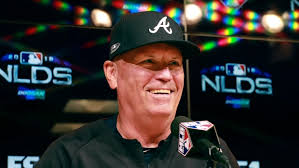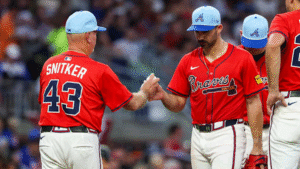
Atlanta Braves Manager Brian Snitker Gives Grim Update on Rotation Health, Urges Long-Term Focus Amid Lost Season
In a recent media briefing, Atlanta Braves manager Brian Snitker laid bare the dismal reality of the team’s current pitching situation, particularly in relation to the club’s starting rotation. Snitker candidly told reporters that there is no imminent return for any of the injured frontline starters—Reynaldo López, Chris Sale, or Spencer Schwellenbach. According to the veteran skipper, none of these pitchers are even close to starting rehab assignments, much less returning to action.

Injuries Derail Hope for Rotation Revival
This update, while not entirely unexpected, serves as a significant confirmation of what many Braves fans had begun to suspect. Despite early-season hopes that the rotation might regain health and effectiveness over time, it has now become clear that such a turnaround is not on the horizon. The Braves’ deteriorating win-loss record further diminishes the urgency of rushing any key arms back into the mix. Without a real shot at contending in the postseason, Snitker and the Braves appear poised to shift their focus from salvaging 2025 to preparing for a healthier and more competitive 2026 campaign.
One of the most telling indicators of the team’s new trajectory is the long-term injury designation of Grant Holmes. He was recently placed on the 60-day injured list, ruling him out for an extended stretch. This follows the even more sobering news regarding AJ Smith-Shawver, who recently underwent surgery that not only eliminates his chances of returning this year but likely sidelines him for a significant portion of the 2026 season as well. Taken together, these developments underscore the gravity of the Braves’ rotation crisis and reinforce the need for caution moving forward.
Opening Day Dreams Become a Distant Memory
When the 2025 season began, expectations for Atlanta’s pitching staff were cautiously optimistic. The team entered the year with a stable core of promising arms, and the hope was that this group could hold up over the grueling MLB season. But as the campaign wore on, injuries ravaged the rotation, turning what was once a strength into a glaring weakness.
Of the five pitchers initially pegged to carry the rotation, only Spencer Strider remains active. And even his performances have been overshadowed by the team’s struggles to consistently support him with run production and a reliable bullpen. With Sale, López, Schwellenbach, Holmes, and Smith-Shawver all out of commission, the Braves have been forced to turn to makeshift solutions.
To that end, Atlanta has added veterans like Erick Fedde and Carlos Carrasco in recent weeks. While these moves were made out of necessity, they have offered little in the way of improvement. Both Fedde and Carrasco are mired in deeply disappointing seasons, and it’s evident that the Braves are simply asking them to eat innings rather than perform at an elite level. This is a stopgap strategy, not a competitive one, and it’s being employed by a front office that knows this season’s playoff dreams are all but dead.
A Fork in the Road: Protecting the Future
Given the current state of affairs, the logical next step for the Braves is to shut down their injured starters for the rest of the year. There is no strategic benefit to bringing them back prematurely. Not only would it be a futile attempt to save a lost season, but it also risks long-term damage to pitchers who are essential to the team’s 2026 plans.
Snitker’s remarks seem to hint that the organization is leaning in this direction. While some fans might find this approach disappointing or defeatist, it reflects a mature and forward-thinking mindset. The club is prioritizing player health and sustainability over short-term gratification, an approach that often pays dividends over the long haul.
It won’t be an easy message to convey to the team’s star players, many of whom are intensely competitive and want to win every game. But part of leadership is making unpopular decisions when they serve a greater purpose. In this case, that purpose is entering next season with a fully healthy and well-rested starting rotation.
Building Toward 2026: Rotation, Bullpen, and Lineup
The silver lining in all of this is that the Braves still possess the foundational pieces required to mount a postseason run in 2026. Their rotation, when healthy, is among the best in the league. Assuming full recoveries from Sale, López, Schwellenbach, Holmes, and Smith-Shawver, and with Strider leading the way, the Braves could reassemble one of the most formidable starting staffs in baseball.
However, a quality rotation alone isn’t enough to ensure success. The Braves will need to take a hard look at their lineup and bullpen this offseason. Offensive inconsistencies have plagued the team throughout the year, and the bullpen has been unable to protect leads or keep games close. These issues must be addressed through aggressive free agency or savvy trades.
This will require full commitment from ownership. If the front office is given the necessary financial resources, there’s no reason Atlanta can’t return to contention. But if budgetary constraints limit the team’s ability to reinforce the roster, another disappointing season could be on the horizon.
No Reason to Rush: Putting the Rotation on Ice
Returning to the matter at hand, Snitker’s statements reflect a recognition that this season is effectively over in terms of playoff aspirations. That being the case, the Braves have no reason to jeopardize the health of their injured starters. These are players who could become centerpieces in the next great Braves team. Rushing them back for meaningless late-season games would be both irresponsible and counterproductive.
Fans might be frustrated, especially those who invested emotionally and financially into the 2025 campaign. But the club’s long-term interests must take precedence. By prioritizing rest and recovery now, the Braves increase their chances of starting the 2026 season with a fully operational rotation. That, in turn, enhances their ability to compete from day one rather than playing catch-up.
The writing is on the wall. The Braves must officially commit to shelving López, Sale, and Schwellenbach for the remainder of the season. This sends a clear message: the organization is focused on building a winner next year, and that starts by taking care of the arms that will form the backbone of that effort.
The Cost of Playing Through Pain
History has shown that rushing pitchers back from injury can lead to disastrous outcomes. Re-injury, decreased velocity, mechanical breakdowns—all are common when pitchers are asked to return too soon. The Braves cannot afford to take that gamble. Sale, in particular, has already endured multiple injuries in recent years, and his value to the franchise depends entirely on his ability to remain on the mound.
Likewise, López and Schwellenbach represent important pieces in the Braves’ long-term strategy. López had been emerging as a reliable rotation piece before his setback, and Schwellenbach remains a tantalizing prospect whose ceiling is still unknown. Preserving their health now maximizes their potential impact down the line.
This season, by contrast, holds nothing for them. The Braves are buried in the standings, and even a miraculous turnaround wouldn’t likely result in meaningful postseason play. With so little on the line, the team’s only rational move is to prioritize health above all else.
Veterans Fedde and Carrasco: Patchwork but Necessary
In the absence of their ideal rotation, the Braves have little choice but to lean on veteran placeholders like Erick Fedde and Carlos Carrasco. These aren’t long-term solutions, but rather temporary bandages meant to get the club through the remainder of the schedule. Both pitchers are struggling to find their old form and are unlikely to be part of the 2026 equation.
Still, they serve a purpose. Their presence allows the Braves to avoid overtaxing young arms or rushing recovering pitchers. Fedde and Carrasco are effectively sacrificial lambs in a season that no longer carries competitive weight. Their performances might not inspire confidence, but their innings help protect the future.
A Look Ahead: What Needs to Happen This Offseason
The Braves’ front office has a clear to-do list heading into the 2025-2026 offseason. First and foremost, they must ensure the continued recovery of their injured pitchers. That means providing the medical support, rehab facilities, and time necessary for full recoveries.
Next, the front office must aggressively pursue upgrades to the batting order. Atlanta has endured stretches of offensive stagnation that cost them winnable games. Adding one or two impact bats—either via trade or free agency—should be a top priority.
Finally, the bullpen needs to be rebuilt. This year’s relief corps has been unreliable, and the Braves need multiple arms capable of bridging the gap from starter to closer. Whether that means re-signing known quantities or seeking out under-the-radar options, change is necessary.
Ownership’s Role: Funding a Comeback
All of these moves require money. Whether the Braves can execute their plan will depend heavily on ownership’s willingness to open the checkbook. The talent is there. The core pieces are in place. What’s needed now is a willingness to invest.
This includes not only the cost of new players but also the financial commitment to player health and development. Shutting down injured pitchers this year is one part of that, but the team must also invest in conditioning programs, medical staff, and analytics to avoid repeating this nightmare season.
Conclusion: Braves Must Look Forward, Not Back
In summary, Snitker’s recent update confirms what many already suspected: the Braves’ 2025 season is effectively over from a competitive standpoint. With no realistic path to the playoffs and an injury list stacked with key contributors, the only responsible course of action is to focus on the future.
That means leaving López, Sale, and Schwellenbach on the injured list and resisting the temptation to rush anyone back. It means embracing the mediocrity of this season in service of a better one down the road. And most importantly, it means putting all the pieces in place to ensure a strong bounce-back year in 2026.
The Braves owe that to their players, to their fans, and to the legacy of a franchise that has always prided itself on competing at the highest level. The time to look ahead is now.
Leave a Reply